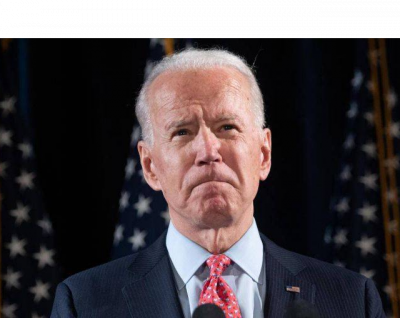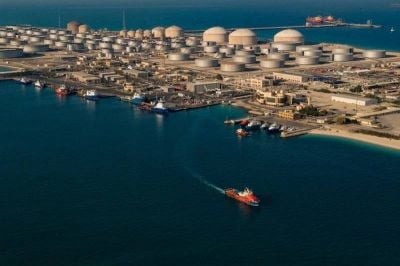Saudi Crown Prince Mohammed Bin Salman shakes hands with Chinese President xi Jinping during his welcome ceremony in Riyadh, Saudi Arabia December 8, 2022. (Credit: Saudi Press Agency/Handout via REUTERS)
Chinese President Xi Jinping met Saudi Arabia's powerful crown prince on Thursday on an Arab outreach visit that will yield billions of dollars in deals and has earned a rebuke from Washington.
Both countries showcased deepening ties with a series of strategic deals, including one with tech giant Huawei, whose growing foray into the Gulf region has raised US security concerns.
King Salman signed a "comprehensive strategic partnership agreement" with Xi, who received a lavish welcome in a country forging new global partnerships beyond the West.
Saudi Arabia and China have also signed memorandums of understanding on hydrogen energy and the encouragement of direct investment between the two states. Both countries also signed an agreement for harmonization between the kingdom's 2030 vision and Beijing's belt and road initiative.
Xi's car was escorted to the king's palace by members of the Saudi Royal Guard riding Arabian horses and carrying Chinese and Saudi flags, and he later attended a welcome banquet.
The Chinese leader held talks with Crown Prince Mohammed bin Salman, de facto ruler of the oil giant, who greeted him with a warm smile. Xi heralded "a new era" in Arab ties.
The display stood in stark contrast to the low-key welcome extended in July to US President Joe Biden, with whom ties have been strained by Saudi energy policy and the 2018 murder of Jamal Khashoggi that had overshadowed the awkward visit.
Arab leaders, including Lebanon's caretaker Prime Minister Najib Mikati, also began to converge on the Saudi capital ahead of a summit with Xi, the leader of the world's No. 2 economy, who will hold separate talks with the six-member Gulf Cooperation Council before leaving on Friday.
China, the top consumer of Saudi oil, has been strengthening its ties with a region that has long relied on the United States for military protection but which has voiced concerns the American presence could be downgraded.
The United States, warily watching China's growing sway and with its ties to Riyadh at a nadir, said on Wednesday Xi's trip was an example of Chinese attempts to exert influence around the world and would not change US policy towards the Middle East.
A memorandum with China's Huawei Technologies was agreed upon despite US unease with Gulf allies over a possible security risk in using the Chinese firm's technology. Huawei has participated in building 5G networks in most Gulf states despite US concerns.
'Non-interference in internal affairs'
The crown prince sees China as a critical partner in his sweeping Vision 2030 agenda, seeking the involvement of Chinese firms in ambitious mega-projects meant to diversify the economy away from fossil fuels.
Key Saudi projects include the futuristic $500 billion megacity NEOM, a so-called cognitive city that will depend heavily on facial recognition and surveillance technology.
China and Arab countries would "continue to hold high the banner of non-interference in internal affairs," Xi added.
That sentiment was echoed by the crown prince, who said his country opposed any "interference in China's internal affairs in the name of human rights," Chinese state broadcaster CCTV said.
Xi, due to meet other Gulf oil producers and attend a wider gathering of Arab leaders on Friday, said China would work to make those summits "milestone events in the history of China-Arab relations", and that Beijing sees Riyadh as "an important force in the multipolar world."
Egyptian President Abdel Fattah al-Sisi, Tunisian President Kais Saied, Palestinian president Mahmoud Abbas and Sudan's de facto leader Abdel Fattah al-Burhan were all flying in on Thursday.
Iraqi Prime Minister Mohammed Shia al-Sudani and Moroccan Prime Minister Aziz Akhannouch have also confirmed their attendance.
'Trusted partner'
China, the world's biggest energy consumer, is a major trade partner of Gulf states and bilateral ties have expanded as the region pushes economic diversification, raising US hackles about Chinese involvement in sensitive Gulf infrastructure.
The Saudi energy minister on Wednesday said Riyadh would stay a "trusted and reliable" energy partner for Beijing and that the two would boost cooperation in energy supply chains by setting up a regional center in the kingdom for Chinese factories.
Chinese and Saudi firms also signed 34 deals for investment in green energy, information technology, cloud services, transport, construction and other sectors, the state news agency SPA reported. It gave no figures but had earlier said the two countries would seal initial agreements worth $30 billion.
Tang Tianbo, Middle East specialist at the China Institutes of Contemporary International Relations (CICIR) — a Chinese government-affiliated think tank — said the visit would further expand energy cooperation.

